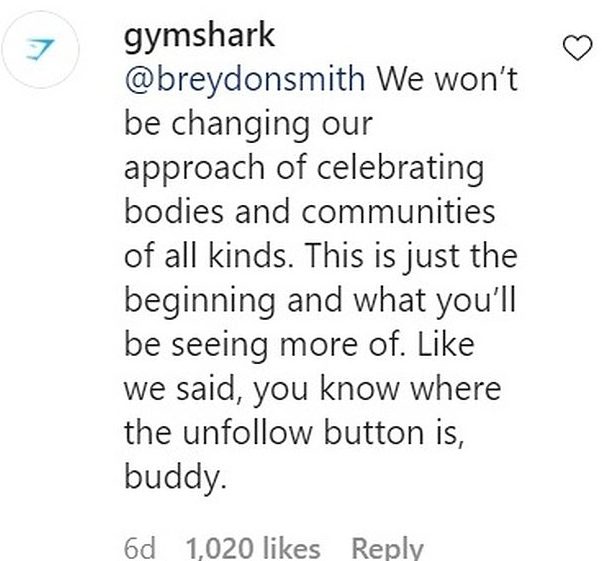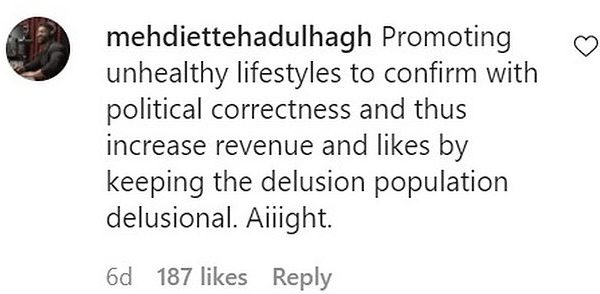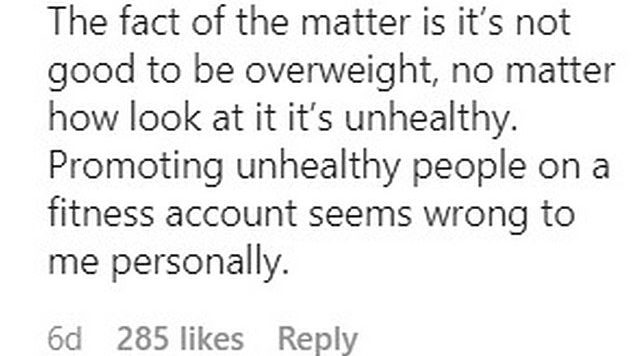Imagine a fitness brand sharing such a disgusting photo.
The only acceptable reason to share images of a fat woman is to shame her.
Coronavirus is the topic of the year, and excess fat is known to significantly increase the risk of dying or having complications from it. Back in March, the British announced that two-thirds of coronavirus patients were overweight. (It should have been known before that, because coronavirus is the flu, and the flu has always had a much higher rate of complication and death among the obese, per the CDC.)
Encouraging fatness in a time when we’re supposed to be fighting coronavirus should be a crime.
Sportswear giant Gymshark has confronted rude ‘fat shamers’ who blasted them over using a model with her belly rolls hanging out – proudly telling angry fans to ‘unfollow’ them if they didn’t like it.
‘Fat-phobic’ followers claimed influencer Nelly London, from Brighton, ‘had no business’ promoting the brand’s fitness wear and claimed they would boycott the ‘woke warriors’ over the range.
But the defiant British retailer said it’s committed to ‘celebrating bodies and communities of all kinds’ and that ‘this is just the beginning’.
Gymshark’s Instagram post shows two pictures side-by-side of Nelly – who boasts 244,000 Instagram followers – wearing turquoise leggings and a matching crop top.
In one snap the waistband is pulled up as she poses for the camera while flexing her arm to showcase her muscles.
However in the other, Nelly wears the leggings with the waistband rolled down revealing her belly and love handles as she closes her eyes, while smiling, with her hands behind her head.
Gymshark’s caption reads: ‘Because we are all both soft whilst also being incredibly strong. One side is not weaker, less valid or less worthy.’
The post, shared eight days ago, racked up more than 613,573 likes and thousands of comments from people, many of whom praised the photos.
But thousands of trolls said Nelly, who is an eating disorder survivor, had ‘no business’ representing the brand.
Gymshark remained unswayed by the backlash, claiming there would be more posts like it and even told some of their fans ‘you know where the unfollow button is’.
Pivoting to fat marketing might seem like a smart move, as most people are fat. However, people are not actually proud of being fat, even if they say they are.
In actual fact, you want to market to people who are fat by making them think if they wear your clothing, they will no longer be fat. That’s how advertisement works.
For example, people do not smile while brushing their teeth. Yet no marketer would say, “we want to advertise toothpaste to people who feel tired when they’re brushing their teeth before bed.”
Putting out images of fat people is a gimmick. Most people didn’t know what “Gymshark” was. Now they do. But having a brand associated with being a fat slob is always a risk, especially if it’s a fitness brand. People are noting that the brand is promoting an unhealthy lifestyle, which brings up ethical issues.
Basically, there is no way that woman works out. It’s literally not possible that if you had any kind of workout routine at all, you could also maintain that amount of fat.
Andrew Anglin rewrote this report entirely.








